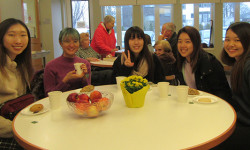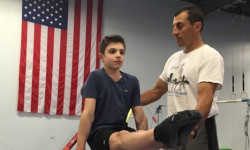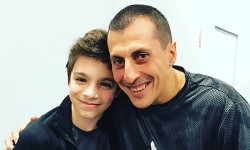[ccfic caption-text format="plaintext"]
By Linda Thomas
Hometown Weekly Correspondent
His moment finally came. He had made it to Rio.
The crowd roared and marveled in response to the gymnast's legendary performance. Arms extended high, straining for the upper bar, twisting into a full turn — launching from the low bar to the high bar.
He was in the midst of the crowd — and might have imagined himself on that high bar.
But on that seventh day of August 2016, Levon Karakhanyan stood on the sidelines and witnessed as his prodigy — 27-year-old Houry Gebeshian, an American-born Armenian — made history as the first female gymnast to represent the Republic of Armenia at the Olympics.
Karakhanyan, 43, never expected his own dream would be realized by making it come true for someone else.
“I knew it was history in the making — and it felt really cool being part of it,” he said. “I thought she deserved to be there, and was glad I had played a small part in being responsible helping her to achieve this wonderful dream that so many athletes have.”
Gebeshian made history a second time that day in August when she achieved immortality on the uneven bars. Her mount, going over the low bar to the high bar with a full twist in between, will be known as “The Gebeshian.”
Karakhanyan points out that only the top eight out of 98 who qualify for the Olympics make it to the event finals, and only three get medals. But developing a new skill is rare and honorable and has a more lasting impact on the sport.
Gebeshian says just getting to the Olympics is a great honor.
She didn’t know Karakhanyan prior to the start of her Olympic journey, but she said she trusted him from the very beginning and knew they would be a great team.
He was more than a coach, she said. He was a liaison - a motivator who knew the right people to contact and how to get her involved.
“I definitely would have had a harder time trying to compete representing the Republic of Armenia if it wasn’t for him. Through him, I was able to communicate to the Armenian Gymnastics Federation in Armenia, which isn't an easy task, especially for me, since I am no longer fluent in Armenian.
“He was my voice when I didn't have one.”
It has been only one year since Karakhanyan and his wife Juliana moved to Medfield, but he has established himself in the community and surrounding towns as a revered gymnastic coach.
Soon after he moved to Medfield, he opened the doors to Massachusetts Elite Gymnastics Academy in Millis, offering Olympic-level gymnastics instruction for competitive and recreational gymnasts at all levels. His students are members of USA Gymnastics, junior regional and national elite teams.
Since coming to America, Karakhanyan has produced a plethora of champion gymnasts on the state, regional and national levels. Also, numerous gymnasts he has prepared have continued to compete on the college level and earned scholarships to such colleges and universities including but not limited to MIT, Stanford, Penn State, William & Mary, Iowa University and the Naval and Air Force Academies.
Addison Chung was 6 when he first trained with Karakhanyan.
Now 12 years later, the young Medfield student considers his long time coach like a “parent” because of the countless life lessons he’s taught him.
“Saying Levon is just a gymnastics coach would be an injustice to him,” Chung said. “One of the most recent mottos he has encouraged me to follow is: ‘No fear. No regrets’”
In short, if you control your fear, you can tackle your problem with your best effort — holding nothing back. And even if you fail to solve the problem with your best effort, you can't have any regrets about what you could've done better, Chung notes.
Karakhanyan first helped Chung apply this lesson in 2014 when he trained for his first U.S. championship.
“Even though I was nervous about competing, he made it clear if I missed this opportunity to compete, I would regret it forever.
“Beyond his teachings, he has given me the opportunity to go to national team camps in Colorado, travel meets in California or Texas, to national level meets in Indiana, Pennsylvania, New Jersey, Missouri, and even international meets in the Czech Republic.
“Levon treats his students with the utmost respect and friendship. He invests his life into making us into great athletes and good people. Without his dedication to me, I would not be anywhere close to the level I am now, nor would I be the person I am today.”
Even his 7-year-old son Edward is learning gymnastics, as well as other sports.
“There is nothing better for young children to start at such a young age and eventually use those abilities to do whatever else they want to do,” he said.
Karakhanyan was born and raised in Armenia. His family lived in the capital of Yerevan. He was an active child who manifested great vigor.
“I climbed the highest tree, ran to the tallest hill and jumped over furniture,” he recalls. “My parents didn’t know what to do with or where to put all that energy.”
He didn’t know it then, but that energy helped to shape and prepare him physically and mentally for gymnastics.
He was soon tested and that energy found a home — and the training began.
Karakhanyan remembers the Soviet team being very dominant, making it hard for him and others to score a spot on the team. But during the Soviet rule, he competed among top junior athletes of the USSR championships and was able to win national titles.
In 1991, when Armenia separated from the Soviet Union, he began to compete internationally representing his country. Then, in 1995, he had an opportunity to compete in a world championship, but there was only one spot for someone to represent Armenia. He was just one step away, having come in second for Armenia.
Gymnastics offers a variety of exercises. On the men’s side, there are six events: floor exercise, pummel horse, still rings, vault over the table, parallel bars and high bar. On the women’s side, there are four events: floor exercise, vault over the table, balance beam and uneven bars.
“It’s endless of how much you can do,” he said. “Every year, there are new skills being invented and the difficulties continue to increase. There are essentially no limits.”
Since coming to the United States 16 years ago, Karakhanyan has continued to establish and maintain a relationship with Armenia. In 2006, he had an opportunity to judge a world championship representing Armenia.
In 2011 he traveled to Tokyo, Japan as the head of delegation for Armenia. It was at that same competition in Tokyo where he and Gebeshian first met. She was there competing in an effort to qualify for the Olympics. But because of an earlier stress fracture she did not perform at her best and ended up being an alternate.
She eventually stopped gymnastics to attend graduate school, but later expressed an interest in a comeback, inquiring as to whether she had a chance to compete as an Armenian in the Olympics.
“I came to Levon during the summer of 2014 and told him I wanted to try and make it to the Olympics again. I think he initially thought I was crazy because I had also told him I had just started working full-time as a surgical physician assistant and hadn’t done gymnastics in three years.
“Lucky for me, I got a call back a couple of weeks later when he told me they would give me a chance, but I had to prove myself first at the European Championships. This was the first competition where Levon stepped in as my coach on the competition floor. He was exactly what I needed when I got there. I had been coaching myself, so it was nice having someone there to give an encouraging word or help move equipment for me so I didn't have to.”
She said their emotional personalities differ, but it actually worked really well for their short relationship as coach and athlete. “I am a very direct, demanding and precise person,” she said, “whereas Levon is a very laid back, easygoing and flexible person.”
Karakhanyan reflects back to his childhood when Armenia was under Soviet rule.
“The recollection I have is very positive,” he said. “Oftentimes, the negative picture painted by the media and some people was not the case for me.
“My mother was home taking care of me and my sister while my father worked very hard to provide for our family making it possible for us to own an apartment and a car and go on vacations.”
More than three decades have passed since that precocious boy from Armenia was seen climbing trees, running up hills and jumping over furniture. He would often hear his family’s protective voices: “Oh, don’t climb there. Don’t do that. You’ll fall and get hurt.”
Then, as his training began to take hold and he became more skilled, those voices changed to ones of encouragement: “Oh, yes. Climb higher. Jump stronger. Flip more.”
Of course, he says, it’s scary to try a difficult skill for the first time.
But once you learn it a second time, it’s a lot easier to do,” he said. “And after you do it many times you don’t even think about it. It’s not scary anymore.
“You start to enjoy it. And you can say, ‘yes, go for it, man. You can do it.’
“You can feel the accomplishment — not necessarily by winning a Gold medal.
“No fear. No regrets.”
For more information, visit: www.masselitegymnastics.com or call (508-376-0102).
Editor’s Note: Linda Thomas writes for Hometown Weekly Publications. For comments and suggestions, she can be reached at lindasfaces@gmail.com.










